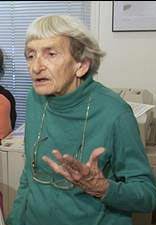 Anne Braden died today in Louisville, KY at the age of 81. Little known nowadays outside her home state and region, Braden, along with her husband Carl who died in 1975, was a pioneering white advocate for racial justice in the U.S. South. A southerner herself, she helped create a series of organizations to combat white supremacy, the evil she believed to underlie all other forms of social inequity in this country.
Anne Braden died today in Louisville, KY at the age of 81. Little known nowadays outside her home state and region, Braden, along with her husband Carl who died in 1975, was a pioneering white advocate for racial justice in the U.S. South. A southerner herself, she helped create a series of organizations to combat white supremacy, the evil she believed to underlie all other forms of social inequity in this country.The incident that made the Bradens famous was their choice in 1954 to buy a house in a segregated subdivision of Louisville for Black friends. White residents objected violently and the other couple, the Wades, saw their house firebombed. The bombers were not arrested, but the Bradens were called before a grand jury and charged with being communist agitators. Carl Braden was convicted of "sedition" against the state of Kentucky and served 8 months of a 15 year sentence before being released on bail.
The state of Kentucky was not through with the Bradens. "In 1967, they were again charged with sedition for protesting the practice of strip-mining in Pike County, Kentucky. Fortunately, they were able to use this case to test the Kentucky sedition law, which was eventually ruled unconstitutional."
From 1957 until 1973, Anne Braden worked with the Southern Conference Educational Fund (SCEF), an interracial organization whose mission was to bring whites into the civil rights movement. Trained as a journalist, she edited its publication, The Southern Patriot. SCEF was redbaited continually and was target of the federal House Un-American Activities Committee (HUAC). From 1975 forward, she worked with the Southern Organizing Committee for Economic & Social Justice (SOC).
Braden's friend, the African American Mennonite civil rights leader Vincent Harding, wrote that when he and his wife Rosemarie first met Braden they knew "we had met a sister, and we knew that we were meant to hold onto each other, both in spite of and because of the attacks that were constantly waged against her. On deep levels, we felt the sense of loneliness that sometimes seemed to surround her" because of the constant redbaiting she and Carl faced. Like the Hardings, Anne Braden was a religious believer (in her case an Episcopalian in a denomination that cannot have been universally welcoming to such a radical.)
Braden's book about the 1954 episode, The Wall Between, is a civil rights classic. Her life and work is the subject of a 2001 biography, Subversive Southerner: Anne Braden and the Struggle for Racial Justice in the Cold War South, by Catherine Fosl.
In 2001 June Rostan interviewed Braden for ColorLines magazine. The veteran activist explained her commitment to struggle for racial justice and her vision of the way forward:
Still wise prescriptions I believe.The "open sesame" for my generation was race. Once we could understand what racism had done, then everything fell like a house of cards. It opened everything to question: economic injustice, foreign policy. If you don't understand white supremacy, then you do not understand the country. The first thing I had to realize was that the people I loved, my family, my friends, the people running Alabama were wrong. But once you realized that, it was not hard to realize that the people running the national government were wrong too.
.... The main thing you do, when you don't see the mass movement you have been hoping for, is work to build struggles around specific issues.... We need an organization in every community that makes a frontal attack on white supremacy. Those organizations need to involve white people and be led by people of color.
Photo: Louisville Courier Journal.
1 comment:
Thanks for sharing this powerful story, Jan. I suspect it will find its way into my sermon on Sunday - she took up her cross and followed Jesus indeed. Blessed Anne sounds like a candidate for the calendar of saints.
Post a Comment